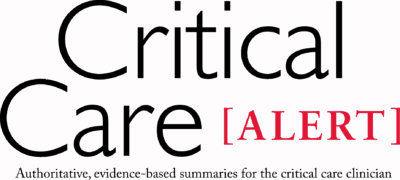
Critical Care Alert – April 1, 2004
April 1, 2004
View Archives Issues
-
Leapfrog and Critical Care: Evidence and Reality in the ICU
Leapfrog Groups standards for critical care are not grounded sufficiently in evidence to mandate their stringent and universal implementation. Rather, most of the guidelines are grounded in common sense and rational extrapolation of the data. As such, they are a reasonable starting point for debate by physicians and policymakers about optimal methods of achieving intensivist-guided care of critically ill patients. -
Predicting Outcome in Pulmonary Embolism Using CT Angiography
No CT variables predicted severe in-hospital morbidity and mortality (death from pulmonary embolism, death from any cause, or cardiac arrest) in patients with PE. However, ventricular septal bowing and increased RV/LV diameter ratio were both strongly predictive of less severe morbidity, namely, subsequent ICU admission, and oligemia was associated with subsequent intubation and vasopressor use. -
Noninvasive Ventilation in Hypoxemic Respiratory Failure
Noninvasive positive-pressure ventilation (NPPV) was assessed in 105 patients with severe acute hypoxemic respiratory failure. The use of noninvasive positive pressure ventilation (NPPV) is effective to reduce intubation and mortality in patients with acute hypoxemic respiratory failure. -
Special Feature: Critical Care Management of the Jehovah’s Witness Patient
Few clinical situations place intensive care practitioners in a more uncomfortable position than does treating patients of the Jehovahs Witness faith. The faith-based refusal of autogenous or allogenic blood transfusions conflicts with the typical life-saving intent implicit in the critical care environment. However, it is our obligation to have a basic level of understanding of the set of beliefs that leads to the choice to refuse this specific set of life-saving therapies, while accepting other aspects of modern medical care. -
Pharmacology Watch: Estrogen Found to Not Affect Heart Disease, Breast Cancer
Antibiotics Associated With Cancer Risk; Topiramate Effective Against Migraine; Statin Therapy For Heart Failure; FDA Actions. -
Clinical Briefs in Primary Care
